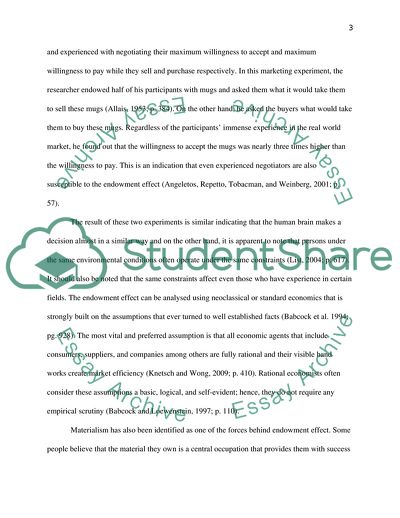Cite this document
(The so called endowment effect is an anomaly in the standard economic Essay, n.d.)
The so called endowment effect is an anomaly in the standard economic Essay. https://studentshare.org/macro-microeconomics/1797162-the-so-called-endowment-effect-is-an-anomaly-in-the-standard-economic-model-often-studied-in-behavioural-economics-survey-some-of-the-evidence-supporting-the-existence-of-such-an-effect-and-critically-analyse-the-extent-to-which-behavioural-economic-theo
The so called endowment effect is an anomaly in the standard economic Essay. https://studentshare.org/macro-microeconomics/1797162-the-so-called-endowment-effect-is-an-anomaly-in-the-standard-economic-model-often-studied-in-behavioural-economics-survey-some-of-the-evidence-supporting-the-existence-of-such-an-effect-and-critically-analyse-the-extent-to-which-behavioural-economic-theo
(The so Called Endowment Effect Is an Anomaly in the Standard Economic Essay)
The so Called Endowment Effect Is an Anomaly in the Standard Economic Essay. https://studentshare.org/macro-microeconomics/1797162-the-so-called-endowment-effect-is-an-anomaly-in-the-standard-economic-model-often-studied-in-behavioural-economics-survey-some-of-the-evidence-supporting-the-existence-of-such-an-effect-and-critically-analyse-the-extent-to-which-behavioural-economic-theo.
The so Called Endowment Effect Is an Anomaly in the Standard Economic Essay. https://studentshare.org/macro-microeconomics/1797162-the-so-called-endowment-effect-is-an-anomaly-in-the-standard-economic-model-often-studied-in-behavioural-economics-survey-some-of-the-evidence-supporting-the-existence-of-such-an-effect-and-critically-analyse-the-extent-to-which-behavioural-economic-theo.
“The so Called Endowment Effect Is an Anomaly in the Standard Economic Essay”. https://studentshare.org/macro-microeconomics/1797162-the-so-called-endowment-effect-is-an-anomaly-in-the-standard-economic-model-often-studied-in-behavioural-economics-survey-some-of-the-evidence-supporting-the-existence-of-such-an-effect-and-critically-analyse-the-extent-to-which-behavioural-economic-theo.


